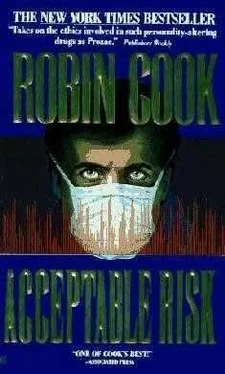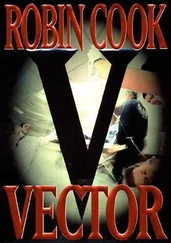Robin Cook - Acceptable Risk
Здесь есть возможность читать онлайн «Robin Cook - Acceptable Risk» весь текст электронной книги совершенно бесплатно (целиком полную версию без сокращений). В некоторых случаях можно слушать аудио, скачать через торрент в формате fb2 и присутствует краткое содержание. Жанр: Триллер, на английском языке. Описание произведения, (предисловие) а так же отзывы посетителей доступны на портале библиотеки ЛибКат.
- Название:Acceptable Risk
- Автор:
- Жанр:
- Год:неизвестен
- ISBN:нет данных
- Рейтинг книги:4 / 5. Голосов: 1
-
Избранное:Добавить в избранное
- Отзывы:
-
Ваша оценка:
- 80
- 1
- 2
- 3
- 4
- 5
Acceptable Risk: краткое содержание, описание и аннотация
Предлагаем к чтению аннотацию, описание, краткое содержание или предисловие (зависит от того, что написал сам автор книги «Acceptable Risk»). Если вы не нашли необходимую информацию о книге — напишите в комментариях, мы постараемся отыскать её.
Acceptable Risk — читать онлайн бесплатно полную книгу (весь текст) целиком
Ниже представлен текст книги, разбитый по страницам. Система сохранения места последней прочитанной страницы, позволяет с удобством читать онлайн бесплатно книгу «Acceptable Risk», без необходимости каждый раз заново искать на чём Вы остановились. Поставьте закладку, и сможете в любой момент перейти на страницу, на которой закончили чтение.
Интервал:
Закладка:
Kim shrugged. “I haven’t the slightest idea,” she said.
Edward walked to a window and fingered the curtain fabric. “I’ve never seen so much drapery in all my life,” he said. “There must be a mile of this stuff.”
“It’s very old,” Kim said. “It’s silk damask.”
“Can I see more of the house?” Edward asked.
“Be my guest,” Kim said with a wave.
From the great room, Edward wandered into the darkly paneled library. It had a mezzanine accessed by a wrought-iron circular stair. The high shelves were served by a ladder that moved on a track. The books were all leather bound. “This is my idea of a library,” Edward said. “I could do some serious reading here.”
From the library Edward walked into the formal dining room. Like the great room, it had a two-story ceiling with matching fireplaces at either end. But unlike the great room, it had a profusion of heraldic flags on flagpoles jutting out from the walls.
“This place could have almost as much historical interest as the old house,” Edward said. “It’s like a museum.”
“The historical interest is in the wine cellar and the attic,” Kim said. “Both are completely full of papers.”
“Newspapers?” Edward asked.
“Some newspapers,” Kim said. “But mostly correspondence and documents.”
“Let’s take a look,” Edward said.
They mounted the main stairs to the equivalent of the third floor since most of the first-floor rooms had two-story ceilings. From there they climbed another staircase two additional floors before reaching the attic. Kim had to struggle to get the door open. It hadn’t been pried in years.
The attic space was enormous since it occupied all of the U-shaped floor plan of the house except for the area of the turrets. Each turret was a story taller than the rest of the building and had its own conical-shaped attic. The main attic had a cathedral ceiling in accordance with the roofline. It was reasonably well lighted from its many dormers.
Kim and Edward strolled down a central aisle. On both sides were innumerable file cabinets, bureaus, trunks, and boxes. Kim stopped randomly and showed Edward that all of them were filled with ledgers, scrapbooks, folders, documents, correspondence, photos, books, newspapers, and old magazines. It was a virtual treasure trove of documentary memorabilia.
“There must be enough stuff in here to fill several railroad cars,” Edward said. “How far back in time does it all go?”
“Right back to Ronald Stewart’s time,” Kim said. “He’s the one who started the company. Most of it is business-related material, but not all of it. There’s some personal correspondence as well. My brother and I used to sneak up here a few times when we were kids to see who could find the oldest dates. The problem was that we weren’t really allowed, and when my grandfather caught us he was furious.”
“Is there as much down in the wine cellar?” Edward asked.
“As much or more,” Kim said. “Come, I’ll show you. The wine cellar is worth seeing anyway. Its decor is consistent with the house.”
They retraced their steps down the main stairways and returned to the formal dining room. Opening a heavy oak door with huge wrought-iron hinges, they descended a granite stairway into the wine cellar. Edward understood immediately what Kim meant about its decor being consistent with the house. It was designed as if it were a medieval dungeon. The walls were all stone, the sconce lighting resembled torches, and the wine racks were built around the walls of individual rooms that could have functioned as cells. They had iron doors and bars over the openings into the hall.
“Somebody had a sense of humor,” Edward said as they walked down the long central hall. “The only thing this place lacks is torture devices.”
“My brother and I didn’t see it as funny in the slightest,” Kim said. “My grandfather didn’t have to tell us to stay out of here. We didn’t want any part of it. It terrified us.”
“And all these trunks and things are filled with papers?” Edward asked. “Just like the attic?”
“Every last one of them,” Kim said.
Edward stopped and pushed open the door to one of the cell-like rooms. He stepped inside. The wine racks were mostly empty. The bureaus, file cabinets, and trunks were pushed against them. He picked up one of the few bottles.
“Good Lord,” he said. “This is an 1896 vintage! It could be valuable.”
Kim blew derisively through pursed lips. “I sincerely doubt it,” she said. “The cork is probably disintegrated. No one has been taking care of them for half a century.”
Edward replaced the dusty bottle and opened a bureau drawer. Randomly he picked up a sheet of paper. It was a customs document from the nineteenth century. He tried another. It was a bill of lading from the eighteenth century.
“I get the impression there isn’t much order here,” he said.
“Unfortunately that’s the case,” Kim said. “In fact there is no order whatsoever to any of it. Every time a new house was built, which had been fairly frequent up until this monstrosity, all this paperwork was relocated and then returned. Over the centuries it got completely mixed up.”
In order to make her point, Kim opened a file cabinet and pulled out a document. It was another bill of lading. She handed it over to Edward and told him to look at the date.
“Well, I’ll be damned,” he said. “Sixteen hundred and eighty-nine. That was just three years before all the witchcraft nonsense.”
“It proves my point,” Kim said. “We just looked at three documents and covered several centuries.”
“I think this signature is Ronald’s,” Edward said. He showed it to Kim and she agreed.
“I just got an idea,” Kim said. “You’ve got me interested in this witchcraft phenomenon and particularly in my ancestor Elizabeth. Maybe I could learn something about her with the help of all these papers.”
“You mean like why she’s not buried in the family burial plot?” Edward asked.
“That and more,” Kim said. “I’m getting more and more curious about all the secrecy about her over the years. And even whether she truly was executed. As you pointed out, she’s not mentioned in the book you gave me. It’s pretty mysterious.”
Edward gazed around the cell they were in. “It wouldn’t be an easy task considering the amount of material,” he said. “And ultimately it might be a waste of time since most of this is business related.”
“It will be a challenge,” Kim said as she warmed to the idea. She looked back in the file drawer where she’d found the seventeenth-century bill of lading to see if there were any more contemporary material. “I think I might even enjoy it. It will be an exercise in self-discovery, or, as you said in relation to the old house, an opportunity to connect with my heritage.”
While Kim was rummaging in the file cabinet, Edward wandered out of the cell and deeper into the extensive wine cellar. He was still carrying the flashlight, and as he neared the back of the wine cellar he switched it on. Some of the bulbs in the sconces had blown out. Poking his head into the last cell, Edward shined the flashlight around. Its beam played across the usual complement of bureaus, trunks, and boxes until it stopped on an oil painting leaning backwards against the wall.
Remembering all the paintings he’d seen upstairs, Edward was curious as to why this one deserved such ill treatment. With some difficulty he managed to work his way over to the painting. He leaned it away from the wall and shined the light on its dusty surface. It appeared to be a painting of a young woman.
Lifting the painting from its ignominious location, Edward held it over his head and carried it out of the cell. Once in the hallway, he leaned it against the wall. It was indeed a young woman. The décolletage it displayed belied its age. It was done in a stiff, primitive style.
Читать дальшеИнтервал:
Закладка:
Похожие книги на «Acceptable Risk»
Представляем Вашему вниманию похожие книги на «Acceptable Risk» списком для выбора. Мы отобрали схожую по названию и смыслу литературу в надежде предоставить читателям больше вариантов отыскать новые, интересные, ещё непрочитанные произведения.
Обсуждение, отзывы о книге «Acceptable Risk» и просто собственные мнения читателей. Оставьте ваши комментарии, напишите, что Вы думаете о произведении, его смысле или главных героях. Укажите что конкретно понравилось, а что нет, и почему Вы так считаете.












